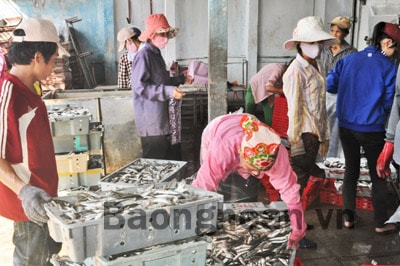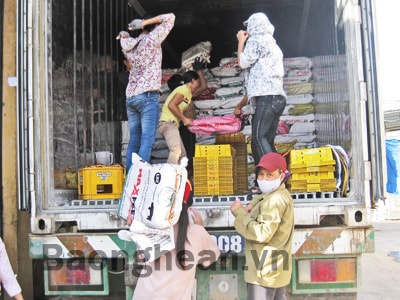Nghi Tan: New fish season
(Baonghean.vn) - We were in Nghi Tan (Cua Lo) when a line of container trucks were coming to eat seafood. Arriving at block 6 - the key area for frozen processing, a strong fishy smell typical of the coastal village rose up. Right on both sides of the wide roads, many people were hurriedly loading and unloading goods.
From early morning, the atmosphere was very urgent at the "frozen warehouse street". Some people washed fish, weighed, packaged, put fish on trays, transferred them to the freezer, and from there transferred them to the storage warehouse. At the freezer of Mr. and Mrs. Hoi Thoa's family, Ms. Thoa said that she had just imported goods from Quang Binh. This amount of miscellaneous fish will be frozen and preserved while waiting for the truck to deliver to the owner. She said that her family has been doing frozen warehouses since 2004, but there has never been a time when Chinese traders have bought as much as now, the purchase and sale output has doubled compared to previous years. Every day in block 6 alone, there are about 5-6 trucks coming to buy goods, since the third lunar month, there have been 5-6,000 tons of goods sold at prices ranging from 6-8,000 VND/kg. Her facility alone these days always attracts over 30 workers. Only about 30% of the fish caught at Cua Lo beach is purchased from Quang Binh, Quynh Luu, Dien Chau, and then exported to China.

Arrange fish in tray
Not far away is the frozen warehouse of Mr. Chu Van Duong's family, who is also the head of block 6. Mr. Duong said that block 6 has 31 frozen warehouses (some warehouses are invested by many households), accounting for 70% of the total frozen warehouses in Nghi Tan ward, and is a member of the frozen seafood processing village. Currently, it is the main season for frozen fish production (from April to August of the lunar calendar), so the production atmosphere is very bustling. Although the output is difficult this year, it is more convenient than previous years because it produces goods (small fish, miscellaneous fish) for Chinese customers.
However, the lesson of dependence on China is clear, people need to be vigilant so as not to be put in a passive position when Chinese buyers stop purchasing. Talking to us about this issue, Mr. Tran Van Minh - Chairman of the Farmers' Association of the ward said: The problem is how Vietnamese businesses can sell goods to China instead of selling through traders in this country. For now, we recommend that people choose reputable agents to sell goods.

Loading goods onto vehicle
The story of Chinese traders coming directly to buy agricultural and seafood products from farmers has been mentioned many times. However, the authorities and localities need to have policies to manage Chinese traders coming directly to buy agricultural and seafood products from farmers more closely. If Vietnamese agricultural and seafood products are too dependent on the Chinese market, our products will not be able to regulate their selling prices.
Thu Huyen






